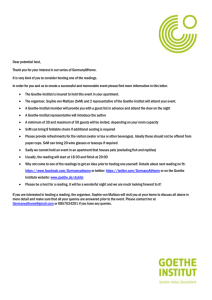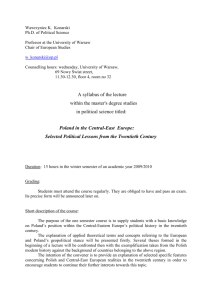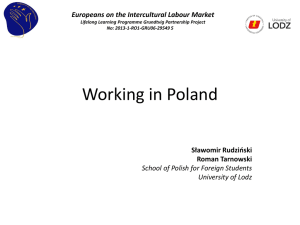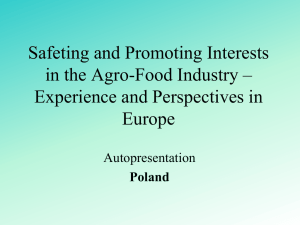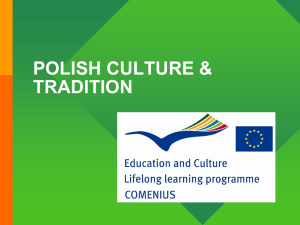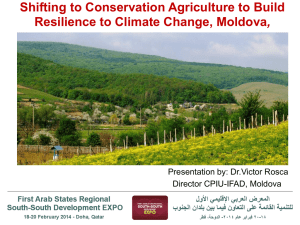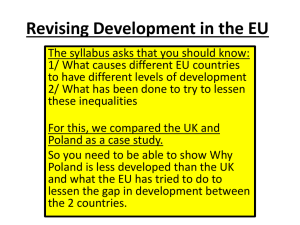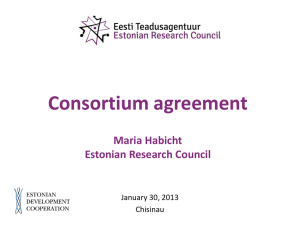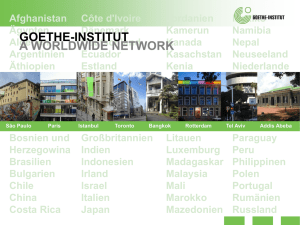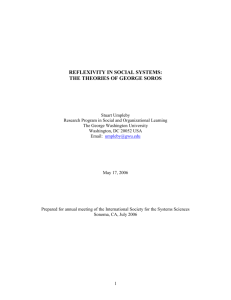Application-form-for-EU-Polish-Study
advertisement
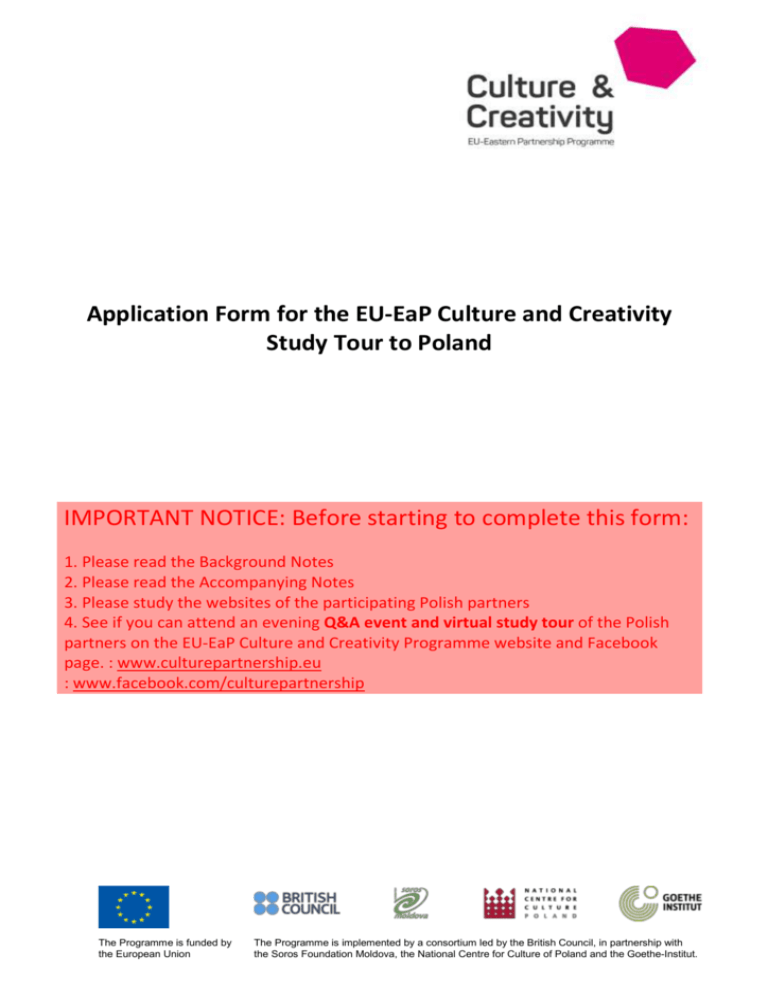
Application Form for the EU-EaP Culture and Creativity Study Tour to Poland IMPORTANT NOTICE: Before starting to complete this form: 1. Please read the Background Notes 2. Please read the Accompanying Notes 3. Please study the websites of the participating Polish partners 4. See if you can attend an evening Q&A event and virtual study tour of the Polish partners on the EU-EaP Culture and Creativity Programme website and Facebook page. : www.culturepartnership.eu : www.facebook.com/culturepartnership The Programme is funded by the European Union The Programme is implemented by a consortium led by the British Council, in partnership with the Soros Foundation Moldova, the National Centre for Culture of Poland and the Goethe-Institut. 1. Details About Your Organisation Name of Organisation Address Contact person Contact details Website/ Social Media page details When was your organization established? What were the main activities of your organization in the last 12 months? (Maximum 400 words) Do you have any potential conflict of interest with the EU-EaP Creativity Programme? * No Yes If, yes please provide details. List the subsectors that your organisation operates in?** How many people work in your organisation? The Programme is funded by the European Union Full time staff: Others: (part time staff, volunteers, interns etc.) The Programme is implemented by a consortium led by the British Council, in partnership with the Soros Foundation Moldova, the National Centre for Culture of Poland and the Goethe-Institut. Does your organisation have any legal, financial or management that could potentially cause a reputational risk*** to the Programme? No Yes If, yes please provide details. I confirm two of our organisation’s staff members will be available to travel to Poland, if we are successful. Signed: Date: 2. 2.1 Please name the Polish organization that you would like to partner with. 2.2 Why are you interested in a partnership with this Polish organization? The Programme is funded by the European Union The Programme is implemented by a consortium led by the British Council, in partnership with the Soros Foundation Moldova, the National Centre for Culture of Poland and the Goethe-Institut. (Maximum 300 words). 2.3 Please provide details of the kind of collaboration**** that you would like to propose to the Polish partner. (Maximum 200 words). 2.4 How would you organize this collaboration? What can your organisation bring, and what would you need additional support for? (Maximum 400 words) 2.5 Please describe what you see as the immediate result of this collaboration. (Maximum 200 words) 2.6 How could you sustain the proposed collaboration over three years? (Maximum 200 words) 2.7 Provide the names and job titles of the two staff members who you are proposing to attend the study tour, and explain The Programme is funded by the European Union The Programme is implemented by a consortium led by the British Council, in partnership with the Soros Foundation Moldova, the National Centre for Culture of Poland and the Goethe-Institut. why they have been chosen. (Maximum 100 words) 2.8 Do you have any other short comments to add that are relevant to this proposal? (Maximum 500 words) The Programme is funded by the European Union The Programme is implemented by a consortium led by the British Council, in partnership with the Soros Foundation Moldova, the National Centre for Culture of Poland and the Goethe-Institut. Supporting Notes: * Conflict of interest is defined as: “A set of circumstances that creates a risk that professional judgment or actions regarding a primary interest will be unduly influenced by a secondary interest." Primary interest refers to the principal goals of the activity, such as the integrity of an application process. Secondary interest includes not only financial gain but also such motives as the desire for professional advancement and the wish to do favours for family and friends. The conflict in a conflict of interest exists if the circumstances are reasonably believed to create a risk that decisions may be unduly influenced by secondary interests. ** Sub-Sectors include; architecture, fashion, museums, archives, tangible and intangible cultural heritage, folk lore, design, performing arts, music, film, TV, radio, publishing, festivals and fairs, computer gaming, visual arts. This is a non-exhaustive list. *** Reputational risk is a risk of loss resulting from damages to an organisation's reputation following an adverse or potentially criminal event even if the company is not found guilty. Adverse events typically associated with reputation risk include ethics, safety, security, sustainability, quality, and innovation. **** Kinds of collaboration The programme encourages any type of institutional capacity building related to creative collaboration. This could include training, “learining by doing”, knowledge sharing, vocational work experience, training and more. The types of collaboration could include the following: Invitations to participate in festivals, organizing exhibitions and events, co-production, mentoring, cultural diversity projects, work experience, master classes, visiting artists in residence, joint project proposal submission, or summer schools. This is a non-exhaustive list. The Programme is funded by the European Union The Programme is implemented by a consortium led by the British Council, in partnership with the Soros Foundation Moldova, the National Centre for Culture of Poland and the Goethe-Institut. Attend a Q&A Event in Your Country to Learn More about this Open Call Over autumn the EU-EaP Culture and Creativity Programme Country Coordinator in each country will host a short evening reception and provide a “Virtual Study Tour” of the six Polish partners. The event will give applicants the opportunity to learn more about each Polish organisation’s plans and future activities. Here you can ask questions about the Study Tour and the overall Programme. Check the Programme’s Facebook page www.facebook.com/culturepartnership and website www.facebook.com/culturepartnership for details. How to Submit the Application Please complete these forms in Russian or English. Once you have filled in this form, please send it to the Culture and Creativity Programme Country Coordinator in your country. Armenia@culturepartnership.eu Azerbaijan@culturepartnership.eu Belarus@culturepartnership.eu Georgia@culturepartnership.eu Moldova@culturepartnership.eu Ukraine@culturepartnership.eu Applications must arrive by midnight on 7th December 2015. Applications received after this date will not be considered. How the Applications will be Assessed The applications will be assessed in three stages: 1. The first stage will be a shortlisting and compliance check to ensure that forms have been completed fully, and meet the criteria of the open call. The Programme is funded by the European Union The Programme is implemented by a consortium led by the British Council, in partnership with the Soros Foundation Moldova, the National Centre for Culture of Poland and the Goethe-Institut. 2. A panel of experts from the Consortium that manages the EU-EaP Culture and Creativity Programme’s will score the shortlisted applications. The panel will include a member from the National Centre for Culture, the British Council and one other consortium partner. The panel members will score the applications separately. 3. The top three scoring applications can then be forwarded to each Polish partner, who will make the final decision. Background The European Union-Eastern Partnership Culture and Creativity Programme 2015-2018 aims at further strengthening cultural policies, particularly the Cultural and Creative Sectors, and to strengthen the capacities of the culture sector and culture operators in the EaP countries. It also aims to increase the links between public institutions and private actors and to include civil society in the decision making process, thus enhancing the role of culture as a driving-force for reform, promotion of inter-cultural dialogue and social cohesion. The Programme is administered by a consortium led by the British Council with its partners: The Soros Foundation-Moldova, The National Centre for Culture of Poland, and the Goethe Institut. A Technical Advisory Team based in Kyiv runs the day-to-day management of the Programme with a team of six Country Coordinators. The Programme runs for 36 months from 1st February 2015 to 31st January 2018. Origin of the programme In the Eastern Partnership countries, public policies have had a tendency to define culture narrowly in terms of heritage, both 19th century traditional and Soviet classical, then “high” culture and ethnic folk culture. This problem of an un-dynamic, narrow definition of culture can be a major stumbling block to cultural policy development and economic growth. It can also be an important limit to the modernisation and development of the agendas that envisage the contribution of culture to other important social spheres (e.g. culture and employment, culture and social cohesion, culture and "well-being", etc.), which are becoming an integrated part of economic and social policy and planning in most European countries. The challenge for EaP countries is to integrate culture into all spheres of society and to pay systematic attention to the independent, private and commercial cultural sectors. The Programme is funded by the European Union The Programme is implemented by a consortium led by the British Council, in partnership with the Soros Foundation Moldova, the National Centre for Culture of Poland and the Goethe-Institut. Evolution of the context In this Programme, culture and creative sectors are understood through a broad approach and in line with the working definition provided in the study “Economy of Culture in Europe” and the European Commission's Green Paper entitled “Unlocking the potential of cultural and creative industries”. In this context, culture encompasses expressions, activities, goods and services in relation to: 1. Core arts areas: performing arts, visual arts, cultural and architectural heritage and literature; 2. Cultural industries: film, DVD and video, television and radio, video games, new media, music, books and press; 3. Creative industries: those industries, which use culture as an input but whose outputs are mainly functional, including architecture, advertising, design and fashion. Cultural operators are defined as all types of organisations and individuals working in the field of culture. The Programme is funded by the European Union The Programme is implemented by a consortium led by the British Council, in partnership with the Soros Foundation Moldova, the National Centre for Culture of Poland and the Goethe-Institut.
